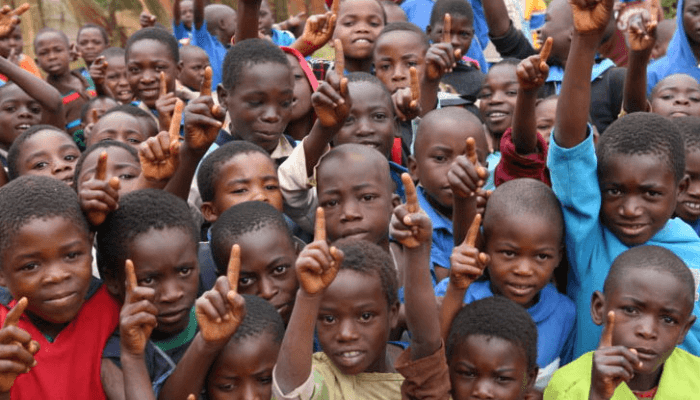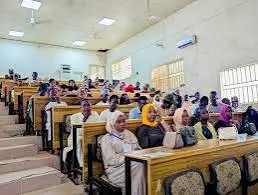In a significant disclosure, the Federal Government has revealed that approximately 2.3 million learners across Nigeria have benefited from its recent basic education interventions over the past six months. The revelation came during the launch of the Ministry of Education’s Communication Strategy for 2025–2027. This milestone, the Minister of Education says, underscores deepening efforts to strengthen foundational schooling and reach vulnerable learners nationwide.
Speaking in the nation’s capital, Dr Tunji Alausa stated that the interventions included construction and renovation of classrooms, provision of learning materials and furniture, and institutional expansions. He also announced the reintroduction of a revamped school feeding programme, leveraging digital payments directly to mothers, to ensure children are well fed and ready to learn.
“The scale of our intervention now extends to over two million children,” the minister declared, adding that steps are underway to monitor pupils’ progress in real time through digital systems. “We now have the capacity to monitor a child from primary to secondary school … and soon the tertiary level.”

Table of Contents
Infrastructure, Materials, Data: The Pillars of the Intervention
According to Dr Alausa, in just six months, the government delivered 4,900 new classrooms, rehabilitated 3,000, built 34 model or SMART schools, and supplied 353,000 pieces of furniture. These combined steps formed the backbone of the basic education interventions that now claim to have positively touched 2.3 million learners.
Beyond physical infrastructure, a major thrust has been data-led oversight. Twenty-one states have migrated their education data into the Nigeria Education Data Initiative (NEDI) — a centralised, secure repository designed to unify records across all levels of schooling.
By integrating the annual school census data into NEDI, the Ministry now claims increased visibility into students’ trajectories from primary through secondary levels, with plans to expand coverage to tertiary institutions. This, Dr Alausa suggests, will help identify learning gaps earlier and enable timely interventions.
Meanwhile, the minister reaffirmed plans to reintroduce the school feeding scheme. But unlike past models, this time the government intends to disburse funds using technology, specifically to mothers, to boost transparency and prevent leakages. Selected states will pilot the initiative, with accountability measures built in to ensure eligible children truly benefit.
This renewed push comes amidst lingering concerns over the suspension of the National Home-Grown School Feeding Programme (NHGSFP) in January 2024, which reportedly left over nine million pupils stranded and thousands of jobs lost.

Challenges, Hope, and the Road Ahead
While the numbers — 2.3 million learners touched — are impressive, observers urge caution in calling the programme a comprehensive success.
One key challenge is sustainability. Infrastructure and furniture can be provided, and data systems installed, but long-term maintenance, staffing, and effective teaching remain open questions. Will classrooms remain functional? Will teachers be motivated, trained, and equipped? Can states consistently upload and manage their student data?
Another hurdle is equity. Nigeria comprises 36 states and the Federal Capital Territory, each with distinct capacities and resource constraints. The fact that only 21 states have migrated data into NEDI suggests uneven participation. Some states might lag behind, widening education gaps across regions.
Moreover, while piloting a technology-driven school feeding programme is laudable, implementing it in remote areas with limited digital infrastructure will be challenging. Ensuring mothers receive payments in time and that funds translate into nutritious meals for children requires strong coordination at the local levels.
Yet, the government’s commitment to transparency and the integration of digital systems presents a hopeful turning point. If properly managed, data-driven oversight and targeted funding could reorient basic education in Nigeria toward higher accountability and improved outcomes.
Dr Alausa’s address, delivered against the backdrop of launching a three-year communications strategy, signals that the Ministry is determined to shift the narrative — from reactive interventions to proactive planning.
As the interventions deepen, key performance indicators will matter: retention rates, pupil learning outcomes, teacher effectiveness, and regional coverage. If the 2.3 million beneficiaries can be translated into measurable gains in reading, numeracy, and general school performance — and sustained across Nigeria’s diverse states — then this may well be a turning point in Nigeria’s education story.

Conclusion
The announcement that 2.3 million learners benefit from basic education interventions is a milestone worthy of attention. It portrays a government willing to invest in foundational schooling, to rethink how basic education is delivered, and to lean more on data and technology for effectiveness.
That being said, the real test lies ahead: converting inputs into outcomes, ensuring sustainability, and making sure no child is left behind — especially in remote, underserved areas. The pilot school feeding programme, the NEDI platform expansion, the classroom interventions — these are all gears of a more ambitious machinery. But whether it will run smoothly across Nigeria’s vast, diverse landscape remains to be seen.
If the ministry can keep the momentum, scale equitable participation across all states, and deliver durable gains in literacy and numeracy, then this 2.3 million figure could someday read as the turning point when Nigeria finally began to reverse decades of weak basic education indicators.
Join Our Social Media Channels:
WhatsApp: NaijaEyes
Facebook: NaijaEyes
Twitter: NaijaEyes
Instagram: NaijaEyes
TikTok: NaijaEyes
READ THE LATEST EDUCATION NEWS




